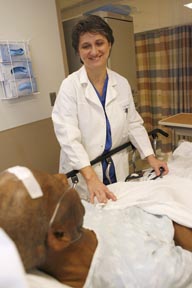Temple to be a regional site for study on patient care in neurological emergencies
 Joseph V. Labolito / Temple University
Dr. Nina Gentile works with a patient at Temple University Hospital.
|
Temple faculty member Dr. Nina Gentile has been selected to head the regional efforts of a nationwide initiative that will lead the way in providing better treatment of patients with neurological emergencies such as traumatic brain injury, stroke and seizures.
Gentile received official notification in late January about the $1 million grant from the National Institutes of Health for Temple University Hospital to serve as a primary clinical study site in the Neurological Emergencies Treatment Trials (NETT) Network. The grant will allow Temple faculty members to develop an effective infrastructure to recruit patients for clinical trials. |
|
Temple-Episcopal, Temple University Children’s Medical Center, Northeastern Hospital, and Hahnemann Hospital will serve as additional sites in the program, said Gentile, an associate professor of emergency medicine in the School of Medicine and a physician at Temple University Hospital. “We’re very excited about this grant because, in emergency medicine, we need to make critical decisions quickly, and these studies will help us further define the right choices,” Gentile said. Nationwide, about 15 million adults and children are seen in emergency departments annually for acute neurological disorders. Most patients are initially evaluated and treated by emergency medicine physicians, not by specialists in neurological diseases. Optimal treatment in the first hours of neurological emergencies is often critical to recovery, according to the National Institute of Neurological Disorders and Stroke. The five-year project will bring together 11 national sites to test the effectiveness of new treatments for neurological emergencies affecting children or adults, which include traumatic brain injuries, head trauma, seizures, stroke, meningitis and spinal cord injuries. The collaborative effort involves emergency physicians, neurologists, neurosurgeons, trauma surgeons, interventional radiologists, rehabilitation therapists and pediatricians. “We’re improving the evidence that we base our clinical practices on … and that will benefit patients here in Philadelphia and across the nation,” Gentile said. “Together, this clinical network will advance the science and treatment of neurological emergencies.” For more information on the Neurological Emergencies Treatment Trials (NETT) Network, visit http://nett.umich.edu/nett/welcome. |
|